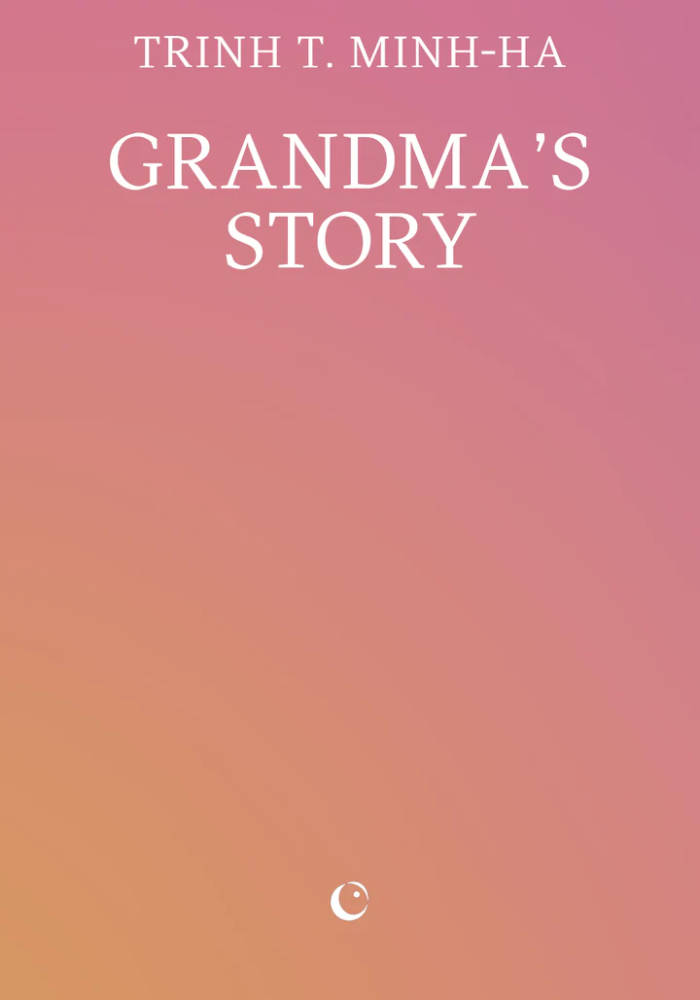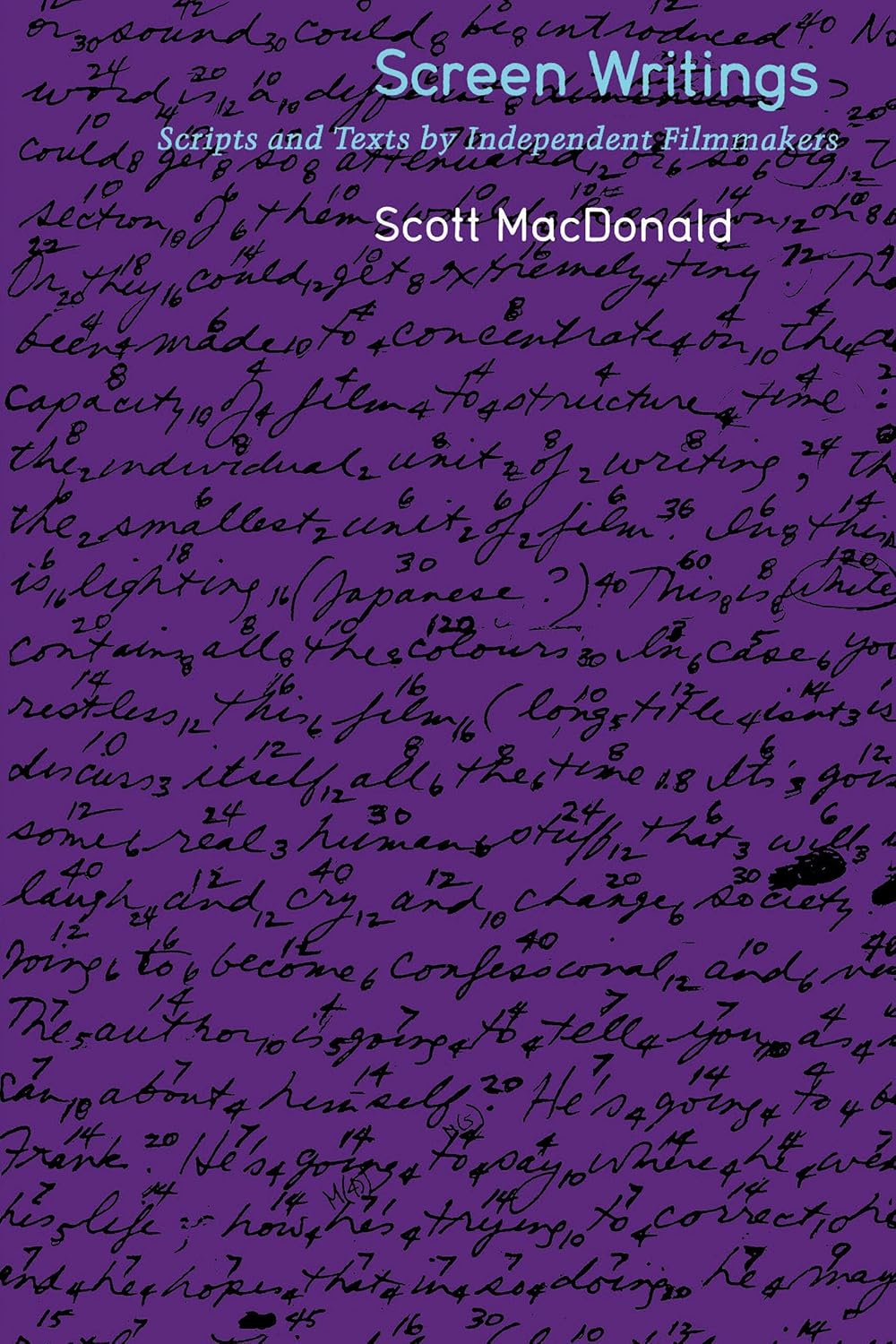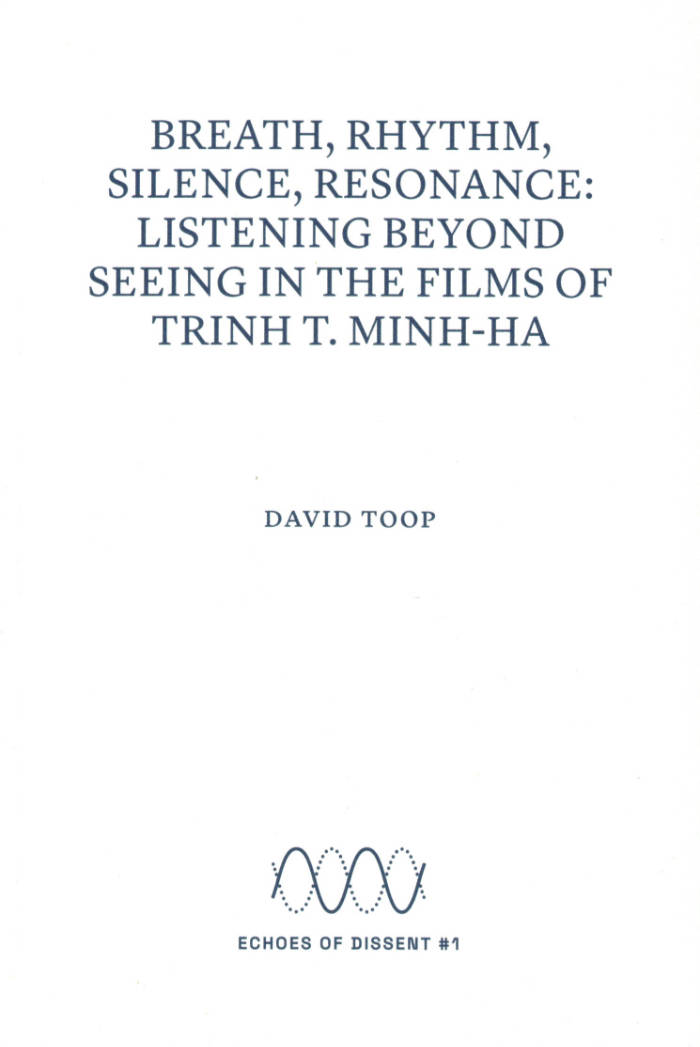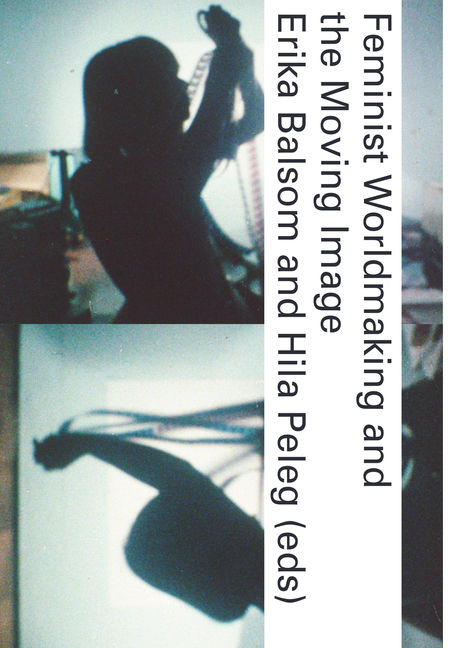Trinh T. Minh-ha
Trinh T. Minh-ha

Grandma’s Story
‘May my story be beautiful and unwind like a long thread . . .’, she recites as she begins her story.
The storyteller is the living memory of her time: at once an oracle, weaver, healer, warrior, witch, protectress, teacher and great mother. Her powers are to do with passing on – not only the stories but transmission itself: ‘what grandma began, granddaughter completes and passes on to be further completed.’
In contrast to the idea that a story is ‘just a story’, pioneering postcolonial feminist theorist and filmmaker Trinh T. Minh-ha recodes ideas about truth and fantasy to tell a different story about power, civilisation, history, medicine and magic. Grandma’s Story shows how creative speech is connected to women’s powers of enchantment, drawing upon and speaking with storytellers including Theresa Hak Kyung Cha, Clarice Lispector, Maxine Hong Kingston, Leslie Marmon Silko and Zora Neale Hurston – all who may be known as ‘she who breaks open the spell’.
The story as a cure and a protection is at once musical, historical, poetical, ethical, educational, magical, and religious.

Traveling in the Dark
A fully-fledged artistic project expanded with writings, poems, and aphorisms by the artist alongside various interviews.
Traveling in the Dark is an exhibition and a publication by the world-renowned film director, poet, writer, music composer, literary critic, and art theorist Trinh T. Minh-ha. The book is a fully fledged artistic project conceived by Trinh from the script and visuals of her film What about China? and expanded with her writings, poems, and aphorisms as well as various interviews that investigate "a relationship to infinity," "memory of the mirror," and the "in-between." The book offers an experience with many possible entries, words, voices, thoughts, images, and pauses. As a visual, poetic, and philosophical experience, Traveling in the Darkinvites us to rethink and experience "reality" differently from an approach mainly based on knowledge and re-presentation that we already possess or that is imposed on us. In other words: How can we learn to see our world without a priori seeing and knowing? In a time when the "all-seen" and "all-told" invade and control our daily lives, our private spheres and urban spaces, where are the areas of invisibility and shadows that leave us autonomy to see and to think, to say and to represent, to remember and to imagine? Traveling in the Dark engages the visitor and reader in an open montage of visual, sonic, and poetic textures, whose resonances, vibrations, recollections, exchanges, brushes, reflections, and passages undermine any pretense of fixed identity, historical truth, or prescribed territory.
Published on the occasion of the eponymous exhibition at Rockbund Art Museum, Shanghai, in 2022-2023.
Born in Vietnam in 1952, Trinh T. Minh-ha is an artist, writer, music composer, filmmaker, and literary theorist, teaching as Distinguished Professor of the Graduate School in the departments of Gender & Women's Studies and Rhetoric at the University of California, Berkeley, San Francisco.

Woman, Native, Other
Woman, Native, Other is located at the juncture of a number of different fields and disciplines, and it genuinely succeeds in pushing the boundaries of these disciplines further. It is one of the very few theoretical attempts to grapple with the writings of women of color. - Chandra Talpade Mohanty
And more

University of California Press
Screen Writings
"Ask audience to cut the part of the image on the screen that they don't like. Supply scissors."—Yoko Ono, Tokyo, June 1964
A dazzling range of unconventional film scripts and texts, many published for the first time, make up Scott MacDonald's newest collection. Illustrated with nearly 100 film stills, this fascinating book is at once a reference work of film history and an unparalleled sampling of experimental "language art." It contributes to the very dissipation of boundaries between cinematic, literary, and artistic expression thematized in the films themselves. Each text and script is introduced and contextualized by MacDonald; a filmography and a bibliography round out the volume.
This is a readable—often quite funny—literature that investigates differences between seeing and reading. Represented are avant-garde classics such as Hollis Frampton's Poetic Justice and Zorns Lemma and Morgan Fisher's Standard Gauge, and William Greaves's recently rediscovered Symbiopsychotaxiplasm: Take One. Michael Snow turns film loose on language in So Is This; Peter Rose turns language loose on theory in Pressures of the Text.
Some of the most influential feminist filmscripts of recent decades—Laura Mulvey and Peter Wollen's Riddles of the Sphinx, Su Friedrich's Gently Down the Stream, Trinh T. Minh-ha's Reassemblage, Yvonne Rainer's Privilege—confirm this book's importance for readers in gender and cultural studies as well as for filmmakers and admirers of experimental writing, independent cinema, and the visual arts in general.

Bodies of Sound: Becoming a Feminist Ear
‘I am concerned with the power of sound! and what it can do to the body and the mind,’ wrote composer Pauline Oliveros. In the body, histories and politics come together with sound and listening, memory and feeling. Bodies of Sound offers a resonant exploration of feminist sonic cultures and radical listening in over fifty contributions. In this book of echoes, a variety of forms – from essays to text scores to art, fiction and memoir – speak across gender, ways of knowing, witnessing, sounding and voicing, translation, displacement, violence and peace.
With contributions from:
Sara Ahmed, Ximena Alarcón, Svetlana Alexievich, Ain Bailey & Frances Morgan, Anna Barham, Xenia Benivolski, Leanne Betasamosake Simpson & Kite, Elena Biserna, Karen Barad & Black Quantum Futurism, Anne Bourne, Daniela Cascella, Theresa Hak Kyung Cha, Maria Chávez, Don Mee Choi, Carson Cole Arthur, Petero Kalulé & AM Kanngieser, Lindsay Cooper, Julia Eckhardt, Lucia Farinati & Claudia Firth, Ella Finer, Annie Goh, Louise Gray, Christina Hazboun, Johanna Hedva, Sarah Hennies, Tomoko Hojo, IONE, Lee Ingleton, Hannah Catherine Jones, Christine Sun Kim, Nat Lall, Cathy Lane, Jeanne Lee & Lona Foote, Marysia Lewandowska, Annea Lockwood & Jennifer Lucy Allan, Cannach MacBride, Elaine Mitchener & Hannah Kendall, Alison O'Daniel, Naomi Okabe, Pauline Oliveros, Daphne Oram, Gascia Ouzounian, Holly Pester, Roy Claire Potter, Anna Raimondo, Tara Rodgers, Aura Satz & Barbara London, Shortwave Collective, Sisters of the Order of Celestial Nephology, Sop, Syma Tariq, Marie Thompson, Trinh T. Minh-ha & Stoffel Debuysere, Salomé Voegelin

Scrapbook – 40 ans de Light Cone
A visual anthology compiling the contributions of the filmmakers who are part of the Light Cone collection, a key institution for the distribution, promotion and preservation of experimental cinema in France and around the world, on the occasion of its 40th anniversary.
2022 marks an important moment for Light Cone: its 40th anniversary. Such an event should be celebrated in the best possible way. Light Cone has come together thanks to the filmmakers whose films entered the collection over the years. We've decided to invite them to participate in an editorial project, a book in which we would publish their contributions: letters, postcards, photographs, drawings, film stills, collages, etc., which they have sent us for the occasion of the anniversary. A collective scrapbook in which the materiality of the objects—paper, photos, colors, handwritten notes—evokes that of analog cinema, which we have always defended. A book of images is born, and through the creation of this micro-collection, so is a portable museum of about one hundred pieces, which are ready to be exhibited and which will remain in the care of Light Cone's archive.
With Michel Amarger, Martin Arnold, Caroline Avery, Peter-Conrad Beyer, Giuseppe Boccassini, Patrick Bokanowski, Louise Bourque, Robert Breer, Dietmar Brehm, Claudio Caldini, Stefano Canapa, Abigail Child, Pip Chodorov, Martha Colburn, Philippe Cote, Sandra Davis, Frédérique Devaux, Karel Doing, Anja Dornieden, Flatform, Cécile Fontaine, Olivier Fouchard, Su Friedrich, Siegfried Alexander Fruhauf, Peter Gidal, Milena Gierke, Christoph Girardet, Juan David, Gonzalez Monroy, Christophe Guérin, Nicky Hamlyn, Barbara Hammer, Teo Hernandez, Tony Hill, Mike Hoolboom, Jakobois, Larry Jordan, Patrice Kirchhofer, Maria Kourkouta, Alexandre Larose, Christian Lebrat, Emmanuel Lefrant, Maurice Lemaître, Jeanne Liotta, Rose Lowder, Johann Lurf, Pablo Marín, Mara Mattuschka, Bruce Mcclure, Miles Mckane, Luc Meichler, Barbara Meter, Peter Miller, Matthias Müller, Michel Nedjar, Dominique Noguez, Vivian Ostrovsky, Simon Payne, Emmanuel Piton, Charlotte Pryce, Gisèle Rapp-Meichler, Abraham Ravett, Emily Richardson, D.N. Rodowick, Gaëlle Rouard, Martine Rousset, Pierre Rovere, Ben Russell, Daïchi Saïto, Maki Satake, Sylvia Schedelbauer, Jeff Scher, Stanley Schtinter, Guy Sherwin, José Antonio Sistiaga, John Smith, Vicky Smith, Michael Snow, Malena Szlam, Mika Taanila, Marcelle Thirache, Trinh T. Minh-ha, David Wharry, Telemach Wiesinger, Antoinette Zwirchmayr.

I Will Draw a Map of What You Never See – Endeavours in Rhythmanalysis
Bonaventure Soh Bejeng Ndikung, Saskia Köbschall and 2 more
A multidisciplinary investigation of the interrelations of space and time, memory, architecture and urban planning through and beyond Henri Lefebvre's concept of Rhythmanalysis.
“The whole universe revolves around rhythm, and when we get out of rhythm, that's when we get into trouble.”—Babatunde Olatunji
A gathering of the echoes, memories and findings after three years of research, performances, exhibitions and conversations within “That, Around Which The Universe Revolves. On Rhythmanalysis of Memory, Times, Bodies in Space”. With chapters in Lagos, Düsseldorf, Harare, Hamburg and Berlin, the S A V V Y Contemporary project and publication bring together visual artists, urbanists, writers, photographers, performers, poets, and theorists to investigate the interrelations of space and time, memory, architecture and urban planning through and beyond Henri Lefebvre's concept of Rhythmanalysis.
Published following the exhibition project “That, Around Which The Universe Revolves. On Rhythmanalysis of Memory, Times, Bodies in Space”, SAVVY Contemporary, Berlin, from December 1st, 2017, to January 28, 2018.
Edited by Elena Agudio, Anna Jäger, Saskia Köbschall, Bonaventure Soh Bejeng Ndikung.
Contributions by Akinbode Akinbiyi, Jacques Coursil, Thulile Gamezde, Gintersdorfer/Klaßen, Noa Ha, Hebbel am Ufer Berlin (Annemie Vanackere & Ricardo Carmona), Kampnagel Hamburg (Caroline Spellenberg), Jan Lemitz, Dorothee Munyaneza, Lucia Nhamo, Christian Nyampeta, Qudus Onikeku, Tracey Rose, Louis Henri Seukwa, AbdouMaliq Simone, Awilda Sterling, Greg Tate, Kathrin Tiedemann, Trinh T. Minh-ha, Tinofireyi Zhou, Percy Zvomuya.

Breath, rhythm, silence, resonance: listening beyond seeing in the films of Trinh T. Minh-ha
In the context of the Artist in focus Trinh T. Minh-ha program at Courtisane festival 2023, Courtisane invited musician, author and curator David Toop to reflect on the sound work in her films. The resulting publication, titled Breath, rhythm, silence, resonance: listening beyond seeing in the films of Trinh T. Minhha, is the first publication in the Echoes of Dissent series, devoted to the politics of the soundtrack.

DEARS No. 5 ever:over
Robert Steinberger, Delphine Chapuis Schmitz and 1 more
DEARS is a print magazine for transversal writing practices at the crossroads of art, poetry and experimental writing. It brings together authors and writers from different backgrounds and constitutes a dedicated platform for texts escaping the usual genres and disciplinary boundaries.
DEARS promotes the exploration of new forms of language as a way to foster new forms of living together, and emphasizes the growing relevance of trans- versal writing practices in this respect.
DEARS no. 5 / Summer 2023 / ever.over
With texts by Diaty Diallo, Douglas Keaney, Dzifa Benson, Sevinç Çalhanoğlu, Jana Vanecek, and an epigraph by Trinh T. Minh-ha.

Strangers Within: Documentary as Encounter
Juliette Joffé, Therese Henningsen
Strangers Within is an anthology exploring the idea of documentary as encounter through essays, stories, interviews and other creative responses by filmmakers, artists, and writers. The texts engage with the risks of encounter, unsettling assumptions about the distinctions between host and guest; stranger and friend; self and other; documentarian and protagonist. Opening up a series of questions about the mystery of another person, whose difference and unknowability is already a part of one’s self, the anthology offers a multidisciplinary approach to understanding the convergences between encounter, hospitality and autobiography.
With Khalik Allah, Ruth Beckermann, Jon Bang Carlsen, Adam Christensen, Annie Ernaux, Gareth Evans, Jane Fawcett, Xiaolu Guo, Umama Hamido, Therese Henningsen, Marc Isaacs, Mary Jiménez Freeman-Morris, Juliette Joffé, Andrew and Eden Kötting, David MacDougall, Trinh T. Minh-ha, Toni Morrison, Bruno de Wachter and Andrea Luka Zimmerman.

Feminist Worldmaking and the Moving Image
This book offers intersectional, intergenerational, and international perspectives on nonfiction film- and videomaking by and about women, examining practices that range from activist documentaries to avant-garde experiments. Concentrating primarily on the period between the 1970s and 1990s, the contributions revisit major figures, contexts, and debates across a polycentric, global geography. They explore how the moving image has been a crucial terrain of feminist struggle—a way of not only picturing the world but remaking it.
The contributors consider key decolonial filmmakers, including Trinh T. Minh-ha and Sarah Maldoror; explore collectively produced films with ties to women's liberation movements in different countries; and investigate the cinematic expressions of tensions and alliances between feminism and anti-imperialist struggles. They grapple with the need for a broader more inclusive definition of the term "feminism"; meditate on the figure of the grandmother; reflect on realist aesthetics; and ask what a feminist film historiography might look like.
The book, generously illustrated with film stills and other images, many in color, offers ten original texts, two conversations, and eight short essays composed in response to historical texts written by filmmakers. The historical texts, half of which are published in English for the first time, appear alongside the essays.
Contributors
Helena Amiradżibi, Madeleine Bernstorff, Teresa Castro, Counter Encounters (Laura Huertas Millán, Onyeka Igwe, Rachael Rakes), Ayanna Dozier, Forough Farrokhzad, Safi Faye, Devika Girish, Elena Gorfinkel, Haneda Sumiko, Shai Heredia, Juliet Jacques, Sarah Keller, Nzingha Kendall, Julia Lesage, Beatrice Loayza, Janaína Oliveira, Lakshmi Padmanabhan, Yasmina Price, Elizabeth Ramírez-Soto, Pooja Rangan, Lis Rhodes, Sara Saljoughi, Rasha Salti, Isabel Seguí, Chick Strand, Monika Talarczyk, Trinh T. Minh-ha, Françoise Vergès, Claudia von Alemann, Mitsuyo Wada-Marciano, Shilyh Warren, Giovanna Zapperi

Why are they so afraid of the lotus?
Based on questions raised by the work of filmmaker Trinh T. Minh-ha, the second volume of the Wattis Institute's annual reader includes new writing and art by Ranu Mukherjee, Kathy Zarur, Shylah Hamilton, Astria Suparak, and Tamara Suarez Porras, as well as written and visual contributions by Trinh T. Minh-ha, Mei-mei Berssenbrugge, Sky Hopinka,Christina Sharpe, Christine Wang, Camille Rankine, Dionne Brand, Renee Gladman, Theresa Hak Kyung Cha, Kameelah Janan Rasheed, and Steffani Jemison, among others.
What does the promise of "speaking nearby" rather than "speaking about" look like today? What are the politics of hospitality? What are the problematics of "postfeminism," and how do we challenge the West as the authoritative subject of feminist knowledge? What are the ways that language can be a site of rupture? How do we generate mistrust in the "well-written," and how can poetry be a radical act of refusal? How can we be subjects that believe in land and not borders? What influence has technology and digital space had on the "making and unmaking of identity"? How do we navigate a cyclical eruption of decolonizations?
The Wattis Institute's annual reader, A Series of Open Questions, provides an edited selection of perspectives, images, and references related to the Wattis's year-long "On our mind" research seasons. Each volume includes newly commissioned writing by members of the research season's core reading group, as well as text and visual contributions by a diverse range of other artists and writers. The title of each reader takes the form of a question and becomes, as new books are published, a gradually evolving series of open questions.